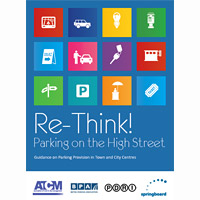 Just published research on town centre car parking across the country suggests that some mid-range and smaller centres overcharged for parking space during 2011 in relation to their retail and leisure offers, suffering higher than average decline in footfall.
Just published research on town centre car parking across the country suggests that some mid-range and smaller centres overcharged for parking space during 2011 in relation to their retail and leisure offers, suffering higher than average decline in footfall.
The report can be found at http://www.atcm.org/shop/shop-ATCM-Publications.php
The study, undertaken by the Association of Town & City Management (ATCM, formerly known as the Association of Town Centre Management) and the British Parking Association (BPA) using data provided by Parking Data & Research International and Springboard’s National High Street Index and Milestone services, reviewed primarily off-street parking tariffs in around 90 locations across the UK.
The report used data on footfall, spend and centre quality to group these locations and assess their relationship to the quantity of spaces and the cost of parking for the first two hours.
The analysis produced the following findings:
• Locations with a weekly footfall of between 200,000 and 249,999 people charge an average of £2.57, roughly 18% more than more popular locations which attract 250,000 to 299,999 people a week.
• The smallest centres attracting fewer than 70,000 people a week charge more for parking on average than those locations attracting up to to 199,999 people a week.
• The mid-range and smaller groupings of centres that charge more than the national average in accordance with their retail and leisure offer suffered a higher than average decline in footfall for 2011.
Notes ATCM Policy Manager Ojay McDonald, “These findings come with caveats. They do not conclusively demonstrate that parking tariffs are influencing decline in locations across the UK, or suggest that all centres in the specified range have tariffs higher than the national average.
“They do however suggest that further research is needed over time to learn more about the relationship between town centre prosperity and parking tariffs and that mid-range and smaller centres in particular must play a role here.”
There is no simple formula that can be given on determining the right kind of tariff to be introduced nationally because every location is exposed to an individual set of dynamics and factors, says McDonald.
“And there is a significant amount of anecdotal evidence, opinion and speculation over the relationship between car parking provision and town centre prosperity.
Maintaining and servicing a car park
“Confusion has been problematic for policy-makers at numerous levels. The problem is most acute for local authorities who have to balance the sometimes conflicting needs of multiple stakeholders and develop accessibility and transport strategies, choosing between sometimes conflicting objectives.
“The costs of maintaining and servicing a car park and the opportunity cost of what other uses that space could have been dedicated to, pitched against the needs of the car user, provide a difficult dilemma for local government, especially in light of a continuing devolution of fiscal responsibility.”
 Kelvin Reynolds, BPA Director of Policy and Public Affairs adds ‘Parking needs to be managed intelligently for it to work as intended, requiring effective enforcement, which costs money. We believe that good quality, well designed and properly maintained car parks can contribute significantly to the prosperity of Britain’s towns and cities.
Kelvin Reynolds, BPA Director of Policy and Public Affairs adds ‘Parking needs to be managed intelligently for it to work as intended, requiring effective enforcement, which costs money. We believe that good quality, well designed and properly maintained car parks can contribute significantly to the prosperity of Britain’s towns and cities.
“The BPA works diligently towards this by sharing best practice, encouraging fair, reasonable and legitimate parking enforcement, and the promotion of safer parking through Park Mark®.”
Other factors also have to be taken into consideration. The majority of these urban centres pre-date the existence of cars and common car ownership. They are not purpose-built to accommodate the car and their density and high concentration of land use along with multiple land ownership make them difficult and expensive to adapt.
This, says McDonald, is why tariffs became a necessity in many locations, to ease congestion as well as to cover costs.
Car parking charges certainly cannot be viewed one dimensionally as a simple revenue source for local authorities. Says McDonald, If such charges damage the viability of a town centre it will have a knock on effect on the resources available to the authority. There could be limited free parking, but it could equally mean the alteration of charges to moderate demand or to reinvest revenue in high quality public transport alternatives.
“It is important to remember that in reality there is no such thing as a free parking space; someone, somewhere is paying for it to be provided, serviced and maintained. The important question is who – Local authority tax payers, local businesses, residents, or the users?
“Ultimately, local government must begin to view health of the local business community as the health of their own organisation and implement policies that support local businesses.
“There are concerns that fees are being introduced in areas where congestion is not an issue, or being raised to levels which stifle local trade. Concerns also surround the diversion of funds away from car parks, not allowing for the necessary reinvestment to take place.”
Town Centre car parking is a complex topic and, repeats McDonald, more research is needed.
The report can be found at http://www.atcm.org/shop/shop-ATCM-Publications.php
